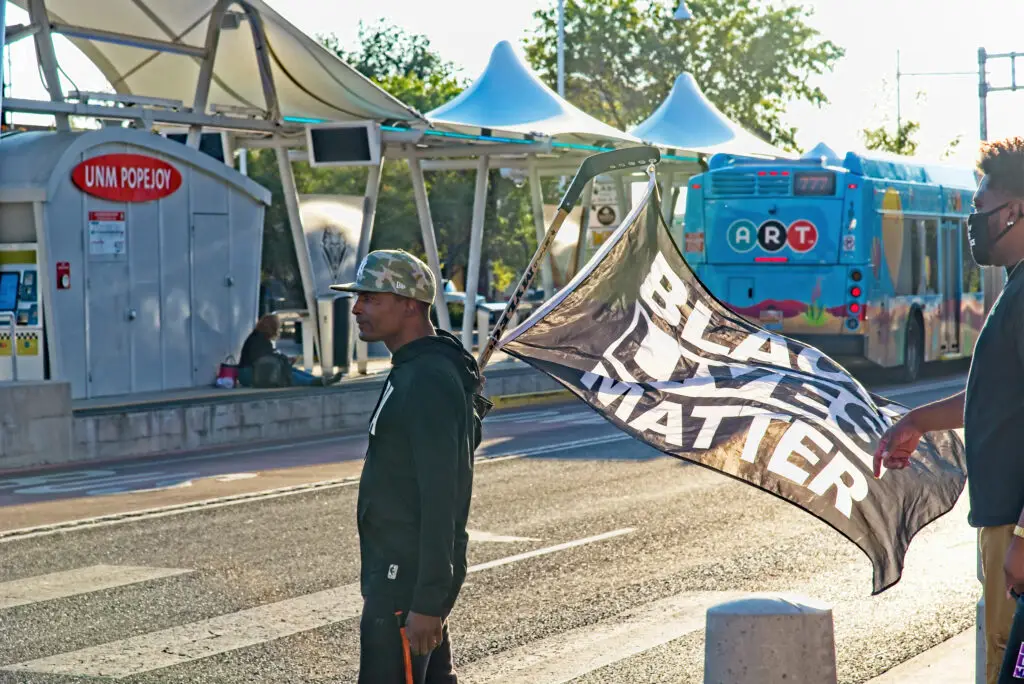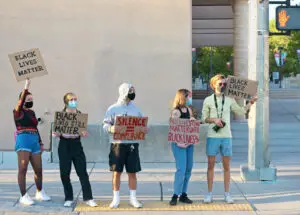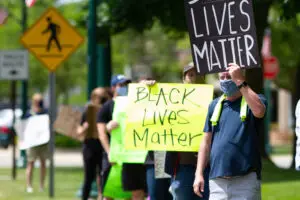(This is the first of three articles in which Timon Cline provides a Christian assessment of Black Lives Matter)
One of the most fascinating things about the past few months is not the resurgence of Black Lives Matter (BLM) in the wake of George Floyd’s murder itself, but rather the widespread support, from seemingly every corner of society, of the organization. Celebrity endorsement is predictable, generally uncompelling, and never interesting. What is new and demanding of our attention is the cascade of financial backing from corporate America (many of whom, like Target, Nike, and Amazon, have had their stores looted during the riots)— though people like Derrick Bell would, no doubt, somehow attribute this development to interest convergence.
As a socio-cultural phenomenon everything that’s happened since May 25, 2020 is truly remarkable. The dominance of the news cycle and popular conversation by BLM is, obviously, noteworthy simply from a historical standpoint. The widespread endorsement of their cause by the business, tech, media, technology, and education sectors may even be concerning to some. As some have suggested, BLM may very well be emerging as the most influential political party in the country, though in a less traditional sense, of course.
But what is most concerning and, frankly, puzzling is how swiftly evangelicals have followed suit, in many cases, uncritically so. A culturally manufactured sense of urgency, peer pressure, and sheer convenience have driven much of this.
For example, Rondell Treviño, founder of something called the Immigration Coalition and who has written for Christianity Todayon the topic, tweeted out, “Just to be clear: Conservative Christians, many White, can [no] longer hide behind the ‘Black lives matter is liberal and Marxist!’ excuse. They should be screaming, ‘BLACK LIVES MATTER!’ from the pulpit, small group meetings, Sunday school classes, and dinner table. No excuses.”
https://twitter.com/Rondell_Trevino/status/1270410516201115650?s=20
One can expect to be berated like this in the Twitterverse, even on #EvangelicalTwitter. No one does (or should) take it that seriously. But things are different when actual denomination leaders or ministry heads more or less say the same thing (perhaps, in a more measured tone).
SBC For BLM
Last month, J.D. Greear posted a video on Facebook in leu of the annual SBC gathering. Included therein was a public, admittedly qualified, affirmation of Black Lives Matter, which, predictably, made waves. In a two-minute clip, an excerpt of the statement in question, posted by Robert Downen, a reporter for the Houston Chronicle, Greear says,
“Southern Baptists, we need to say it clearly, as a Gospel issue, black lives matter. Of course, black lives matter! Our black brothers and sisters are made in the image of God.
Black lives matter is an important thing to say right now because we are seeing in our country the evidence of specific injustices that many of our black brothers, sisters, & friends have been telling us about for years…And, by the way, let’s not respond with saying, oh, ‘all lives matter.’ Of course, all lives matter…We are saying that we understand that our black brothers and sisters have perceived for many years that the processes, the due processes of justice have not worked for them for many years.
And by the way, lets spare each other the quotation of stats right now… if you talk to some black friends…they can tell you about their experiences and how some of them can be quite different from some others in our country.
Then he says, again, emphatically, “Black Lives Matter.” Greear adds that “the movement and the website has been hijacked by some political operatives whose worldview and policy prescriptions would be deeply at odds with [his own],” and that he does not align himself with the BLM organization, though he maintains that the sentiment behind “it” (presumably BLM as a movement and organization) is true. (Downen also wrote up an article at the Chronicle on Greear’s statement). With Greear in office for another year (due to COVID-19 forcing a cancelation of the annual convention) one begins to wonder whether, given what transpired with Resolution 9, a resolution to this effect will be presented in 2021.
Greear, it must be said, offers no evidence to substantiate the claim that BLM the organization, and its website, have been “hijacked” by some nameless political operatives, the apparent suggestion being that BLM has been corrupted thereby, departing from its pure meaning and original mission. As I have argued elsewhere, the hijacking narrative is specious at best, one that other leaders of major organizations have attempted to use to supply themselves with plausible deniability.
The response to Greear’s address varied. Former SBC president, James Merritt, including a link to the video, tweeted, “Any follower of Christ should say without hesitation or equivocation that black lives matter. God’s word says so. The cross says so. God’s Love in me says so. Good on you @jdgreear.”
Any follower of Christ should say without hesitation or equivocation that black lives matter. God’s word says so. The cross says so. God’s Love in me says so. Good on you @jdgreear https://t.co/pAG7o7eRdW
— Dr. James Merritt (@drjamesmerritt) June 11, 2020
Less enthusiastic was Thomas Coutouzis, an author, who asked on Twitter, “Serious question @jdgreear I saw a 2 minute clip of your video. Are you endorsing this movement? Below are their beliefs if you haven’t seen them, the vast majority of which are opposed to what Scripture teaches.”
Serious question @jdgreear
I saw a 2 minute clip of your video. Are you endorsing this movement? Below are their beliefs if you haven't seen them, the vast majority of which are opposed to what Scripture teaches. https://t.co/b02CFvTb1t
— Thomas (Σταμάτης) (@ThomasCoutouzis) June 10, 2020
Good question. To the tweet, Coutouzis conveniently attached the “What We Believe” section— what could more accurately be called a confession or doctrinal statement; it reads just like any number of such statement from evangelical churches across the country— of the BLM website.
To be fair, as the full video (posted to Greear’s Facebook page) reveals, Greear, at some unspecified level, does not endorse all of the policy prescriptions and worldview of BLM as represented in their statement of belief (which, as already established, he believes are the result of an unsubstantiated “hijacking”). Though he never specifies which portions of the statement he rejects we can be charitable and presume the best here. But the question is whether Greear’s move is tenable. Can he have his cake and eat it too? (More on that later).
When the president of the largest Protestant denomination in America voices his support for BLM, imploring his fellow Christians to chant (or tweet) the phrase, show solidarity, and (to some extent) publicly pledge themselves to the orthodoxy, the average churchgoer might be tempted to follow suit. It seems simple enough. Do not the lives of black people matter?
Apart from the coarse phrasing, in short, the answer for any Christian would presumably be in the affirmative. If black people are, in fact, not only part of God’s creation (i.e. they exist) but human beings endowed with reasonable souls (i.e. the imago Dei), which they obviously are, then they possess inherent, irreducible, inalienable worth, significance, importance, value— any way you put it, it is infinitely weightier than the simple “matter” but, admittedly, much less catchy. It seems rather un-dignifying to put it so simply. (But there is a good reason theologians are not consulted on these sorts of things, I suppose). In the abstract, “black lives matter” is an uncontroversial if rather sloppy phrase.
More Than Meets the Eye
In our political context, however, there is more than meets the eye in “Black Lives Matter” (even if you don’t capitalize it, as some have suggested). This much is clear from the insistence by Greear and many other that the substitution of “All Lives Matter” for “Black Lives Matter” is unacceptable, even detestable. A statement on behalf of Gordon Conwell Theological Seminary by Dr. Gina Zurlo (the director of the seminary’s Center for the Study of Global Christianity) maintained that “the insistence that ‘All Lives Matter’ as a counter claim to ‘Black Lives Matter’ is evidence of white tone deafness to cries against grave social injustice since black lives are at much greater risk than others.”
But if “Black Lives Matter” is true, then would not “All Lives Matter” be infinitely truer? In abstract, yes, but not contextually or politically, it is urged by people like Greear, Zurlo, and Jarvis Williams.
However, as Al Mohler has argued at Public Discourse,
“‘Black lives matter,’ taken as a sentence, is profoundly true. God made every human being in his image, which means every life on the planet, at every stage, matters. Every human being possesses full human dignity, and by extension, full human rights… But it’s not that simple. Black Lives Matter did not emerge merely as a sentence. Those three words function as a message and a platform making a significant political statement.”
Along the same lines, Andrew Doyle has explained well how the protests surrounding George Floyd’s death (but not the organizations themselves, mind you) have been infiltrated, and violence stoked, by various radical groups. Unfortunately, groups like Antifa and BLM, “rely on the good nature of a public who are likely to interpret their name[s] literally. After all, only a fascist would complain about anti-fascism.” Doyle then references how the NPR correspondent Mara Liasson proved the point by describing the allied landing at Normandy as the “biggest Antifa rally in history.”
Of course, the allied forces who stormed the beach on D-Day 1944 were adamantly opposed to fascism, and the whole “odious apparatus of Nazi rule,” to quote a now canceled British prime minister (i.e. dead white guy). But even the Anti-Defamation League knows that there is a distinction between “Antifa” in our present context and anti-fascist sentiments generally (i.e. basically, everyone else). There is much debate about how to define Antifa, but this much is clear.
Likewise, in the case of BLM, Christians should at least know what they are pledging fealty to before they follow headlong after their fearless leaders. They should also be alert enough to the political context to discern relationships between organizations or movements and their slogans, and temper or adjust their speech accordingly. Christians are not in control of said slogans. They do not crop up in a vacuum. And even if each of us was able to customize the meaning of a given phrase such would be undesirable. In such a scenario the phrase in question would lose all meaning. Ironically, certain evangelical voices demand that Christians be more politically aware, but in arguing that “black lives matter” can be affirmed without affirming all that BLM stands for is a plea to be decidedly un-politically-aware, that is, non-contextual.
Further, as Doyle says, “we must feel able to discuss movements such as Black Lives Matter critically, and not simply assume that its objectives are straightforwardly encapsulated by its name,” adding that the BLM movement “is not solely about standing up to racism, a goal that anyone with an intact moral compass would share.” Doyle is correct but let us unpack BLM for ourselves. Part 2 will attempt to do just that. Whether the reader is a full-throated supporter of BLM or a skeptic, its important for Christians in particular—because we represent more than just ourselves—to fully grasp the meaning, intent, and import of what they are subscribing to.
Before we delve into the exact meaning of key passages in the BLM statement of belief (many of which the reader will, no doubt, be aware of at this point), it may be helpful to provide a brief overview of the formation of the organization. As will be argued here, the organization is inextricably linked to the slogan “black lives matter” and the movement itself.
Origin Story
In 2013, in response to the acquittal of George Zimmerman (after being charged with the murder of Trayvon Martin, Alicia Garza first used the words “black lives matter” in a public letter. Patrisse Kahn-Cullors then created a, what turned out to be viral, hashtag (#BlackLivesMatter) to accompany the letter posted on Twitter. Opal Tometi (who came to be known as the third co-founder of BLM) was instrumental in capitalizing off the huge response to the letter and hashtag by developing a larger social media presence. In short order— viz., 2014 following the death of Michael Brown in Ferguson and Eric Garner in New York City— the three founded the organization Black Lives Matter, now a network of 30 or more regional and international chapters. Per Kahn-Cullors, BLM is best understood as a network. Indeed, she resents the media’s persistence in calling it a “movement.” For her, BLM is just the latest iteration of centuries-long activism against anti-black racism and black liberation movements. Though allergic to hierarchy and established leadership— it is “adaptive and decentralized”— BLM nevertheless coalesces around “a set of guiding principles.” (Those “principles” will be the subject of Part 2). Its also worth noting that BLM later joined forces with the Movement For Black Lives (M4BL) which enjoys a global presence.
What really sets BLM apart, per its founders, is that it is self-consciously, “radically intersectional” (more on that in Part 2). BLM also stands against so-called neoliberal approaches to activism and opts instead for “Black radicalism.” In the mind of the BLM founders, the former is untenable because it
can’t and won’t end violence against all Black people because neoliberalism relies on rigorous self-interest based platforms, the dismantling of social services, privatization and, due to its roots based in capitalist white supremacy, commits to specific strategies around policy agendas and reformist rhetoric that still requires the construction of an “other”.
In the minds of critical race theorists, neoliberalism serves only to obfuscate the imbedded, systemic racism of western society. Commitments to proceduralism, objectivity, conceptions of fairness, and neutral (or colorblind) policies is not only counterproductive but actually promotes the racist status quo. This, in part, gets at the consternation amongst BLM supporters regarding “All Lives Matter.” Sentiments animating ALM actually perpetuates whiteness, it is claimed, thereby hampering progress. “All” is considered by CRT scholars to be coded language for “white” because white is the norm in a white supremacist society. ALM, then, is the response of detractors. A “Black radical agenda,” on the other hand, unapologetically “calls for an eradication of white supremacy and an adoption of values and traditions endowed from the Black experience.”
Taking this brief origin story into account, what should be clear is that the slogan “black lives” matter and the subsequent network or organization share a common origin and founding. The two cannot be separated from a historical or conceptual standpoint. This makes what was argued above all the more compelling: the statement “black lives matter” does not, in any sense, exist in the abstract. There is a concrete moment and occasion of creation and the use of the phrase and movement, network, organization have all the while been guided by the creators of the same. As mentioned already, Part 2 of this series will attempt to elaborate the meaning of the guiding principles (and policy demands) of this network.































